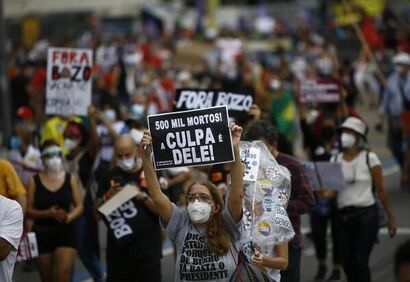2318-2320 Carinansian political crisis: Difference between revisions
No edit summary |
|||
| Line 48: | Line 48: | ||
=== Democratising reforms === | === Democratising reforms === | ||
After the assumption of the presidency by [[Caroline Hamada]] in 2320, the leading figures of the Anti-Fascist Coalition, now known as the 'Architects of the Renewal', worked to establish the new Anti-Fascist Serenist model of government, with strong principles and entrenched clauses to prevent the abuse of power or centralisation of authority. | |||
Latest revision as of 21:06, 6 November 2024
| 2318-2320 Carinansian political crisis | ||||
|---|---|---|---|---|
 Anti-government protests in São Lenoas, 2318 | ||||
| Date | October 13, 2318 - April 15, 2320 | |||
| Location | ||||
| Caused by |
| |||
| Resulted in | Victory of the Anti-Fascist Coalition
| |||
| Parties to the civil conflict | ||||
| ||||
| Lead figures | ||||
| ||||
| Casualties | ||||
| Arrested | Serene Revivalist government
| |||
Then 2318-2320 Carinansian political crisis (Carinansian: 2318-2320 Crisis política de Carinansia), also sometimes referred to as the Second Carinansian Revolution (Carinansian: Segunda revolución carinansiana) or sometimes informally The Final Days (Carinansian: Los últimos días) is the set of events, that transpired in Carinansia from October 2318 to April 2320.
Prelude
Tecian-Azlan War
Infiltration of the government
Serene Revivalist dictatorship
Impeachment of Carlos Macedo
Central Government Response
Guillermo Macedo
Enrique Campos
Rezendist Government
Rezende's Coup
The Dark Days
Lobos Presidency
New Elections
Aftermath
Democratising reforms
After the assumption of the presidency by Caroline Hamada in 2320, the leading figures of the Anti-Fascist Coalition, now known as the 'Architects of the Renewal', worked to establish the new Anti-Fascist Serenist model of government, with strong principles and entrenched clauses to prevent the abuse of power or centralisation of authority.